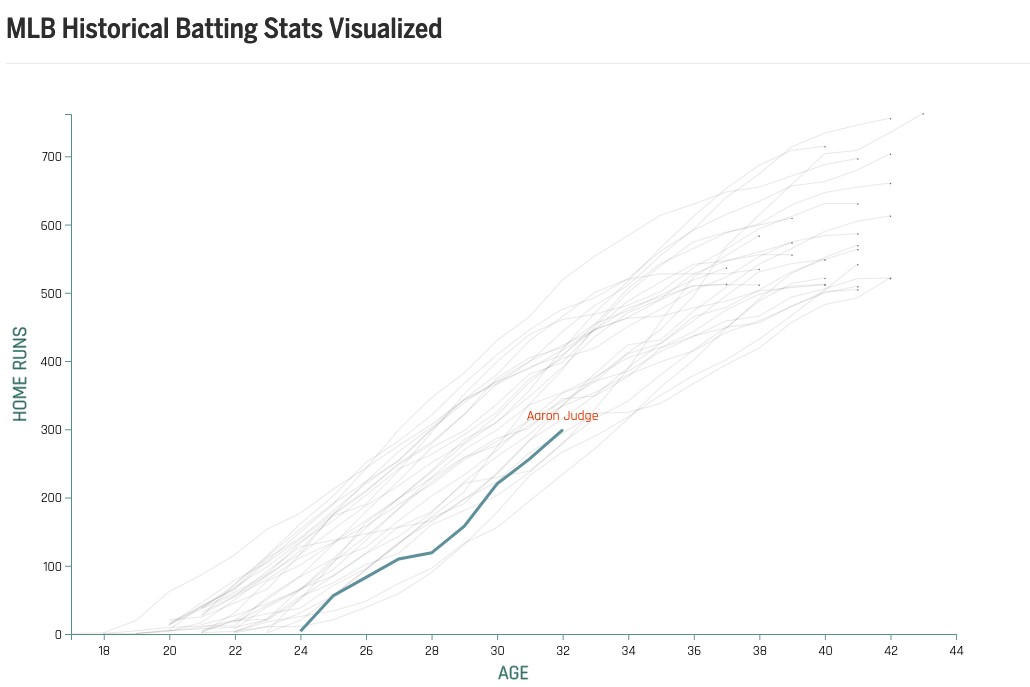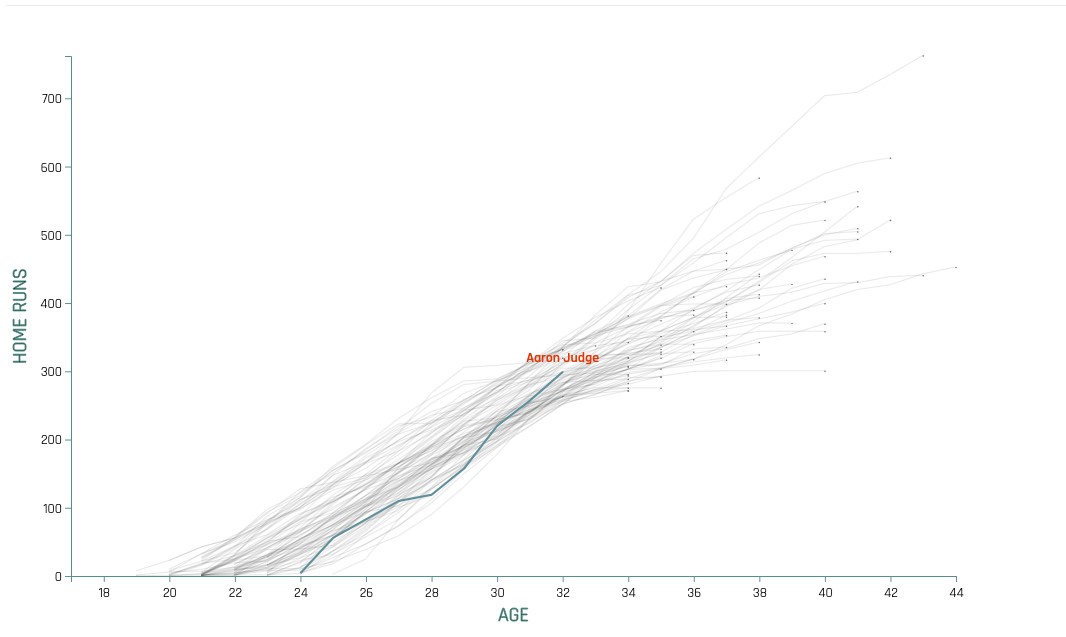On Aug. 13, 2016, a Yankees prospect by the name of Aaron Judge stepped to the plate at Yankee Stadium for his first Major League plate appearance. In a sign of things to come, he walloped a 446-foot shot to dead center field, over the glass panels above Monument Park.
Eight years and one day later, Judge has once again reached a major home run milestone. Facing the White Sox on Wednesday night in Chicago, his eighth-inning homer off Chad Kuhl gave him 300 for his decorated career.
At a moment like this, while we pause to appreciate what Judge has accomplished up to this point, we also can’t help but look ahead to what’s next. Which other milestones are ahead? How high on the all-time list can Judge climb?
A lot of the answer depends on which of two ways you view Judge’s ascent to this point. By one measure, he’s by far the fastest player in Major League history to reach the 300 mark. But by another, he’s nowhere near the top of the list and, compared with current members of the 500 HR Club, actually far below average.
Let’s break it down.
METHOD NO. 1: GAMES PLAYED
That sensational first impression aside, Judge largely struggled in his first taste of the big leagues in 2016, posting a .608 OPS and hitting four homers in 27 games. But by the beginning of the following season, he was a fully formed slugger who immediately began terrorizing pitchers. Judge launched 10 big flies and slugged .750 in April 2017, and he never looked back.
By season’s end, he had established a new rookie home run record (52, later surpassed by Pete Alonso). Since then, the only thing that has slowed down Judge has been health. Judge has spent time on the injured list in five different seasons, playing only 112 games in 2018, 102 in '19, 28 (of a possible 60) in '20 and 106 in '23. But when healthy, he has consistently hit the ball out of the ballpark at a frenetic pace. That’s especially true over the past three seasons, with Judge setting an AL record with 62 homers in 2022 and challenging that mark again this year.
All of which leads to this: Nobody has ever reached 300 homers faster than Judge, and it’s not even close.
Fewest career games at time of HR No. 300
(Via Elias Sports Bureau)
- Aaron Judge: 955th game
- Ralph Kiner: 1,087th game
- Ryan Howard: 1,093rd game
- Juan Gonzalez: 1,096th game
- Alex Rodriguez: 1,117th game
Of course, one glance at that list will tell you that leading it offers no guarantees. Among Kiner (369), Howard (382) and Gonzalez (434), none wound up approaching 500 career homers due to a combination of injuries and age-related decline.
On the other hand, Judge is well ahead of the games-played pace set by the current members of the 500 HR Club. Rodriguez (1,117 games) is the fastest among that group of 28 sluggers, while Rafael Palmeiro (1,717) is the slowest. The average was 1,327 games, or about 2.3 full season’s worth of games more than Judge.
Games played to reach 300 HR
Among members of 500 HR Club
Less than 1,100 games: 0
1,100-1,199 games: 7
1,200-1,299 games: 7
1,300-1,399 games: 7
1,400-1,499 games: 3
1,500-1,599 games: 2
1,600-1,699 games: 1
1,700-1,799 games: 1
Median: 1,305 games
Judge has homered about once every 3.2 games over the course of his career. At that pace, it would take him only about four full seasons to get from here to 500. While that assumes a degree of good health that Judge is unlikely to achieve, the good news is that, historically speaking, members of the 500 HR Club get from 300 to 500 at about the same rate of games per homer (4.3) as they get from 0 to 300 (4.4).
The obvious caveat to that: survivorship bias. Players whose pace falls off too steeply never make it to 500 at all. And that brings us to our next point.
METHOD NO. 2: AGE
The flip side of Judge more or less hitting the ground running in the Majors is that it took him a while to get there. A 2013 Draft pick after three collegiate seasons at Fresno State, Judge then spent most of the next three seasons in the Minors before making his splashy debut.
As a result, he was already more than three months past his 24th birthday when he arrived in the Majors. While that doesn’t sound that old, the reality is that for a would-be 500 HR Club member, it’s ancient. Each of the 28 sluggers to reach that threshold were in the Majors before their 23rd birthday. In fact, eight debuted as teenagers, and 24 did so at age 21 or younger. That puts Judge far behind.
Oldest debuts by members of 500 HR Club
- Mike Schmidt: 22 years, 351 days
- Mark McGwire: 22 years, 325 days
- Ernie Banks: 22 years, 229 days
- Frank Thomas: 22 years, 67 days
- Rafael Palmeiro: 21 years, 349 days
Median age: 20 years, 232 days
Aaron Judge: 24 years, 109 days
(It should be noted that going purely by debut age can sometimes be misleading, too. Some players who debuted extremely young, such as Mel Ott, did not play much early in their careers. Babe Ruth debuted at 19 but mostly pitched until he was 24. Ted Williams debuted at 20 but lost his age 24-26 seasons while serving in World War II.)

Now, as mentioned, Judge has made up for lost time since then. But there is only so much he can do in this respect. At 32 years and 110 days, Judge is more than four years older than A-Rod, the youngest 500-homer hitter to reach the 300 mark (27 years, 249 days). Of the 28 members of that club, 11 got to 300 prior to turning 30, compared with only five who did so after turning 32: Gary Sheffield, Ted Williams and Mark McGwire were all 32, while David Ortiz and Rafael Palmeiro were 33. (Barry Bonds and Jim Thome are the oldest among those who reached 600 homers -- both were about three months shy of turning 32.)
WHAT LIES AHEAD
So while Judge’s path to the upper reaches of the all-time homer list is not unprecedented, it will be difficult. One reason? In this era of PED testing and increasingly tougher pitching, it’s harder than ever to be an aging hitter.
In 1998, a 34-year-old McGwire broke Roger Maris’ single-season home run record. Three years later, a 37-year-old Bonds passed McGwire. But while hitters 33 and older accounted for an all-time record 1,266 homers across the Majors in that latter season, that number had dropped by more than half by 2022 (555) before bouncing back slightly a year ago (653). In the past six full seasons, only one hitter 33 or older (Nelson Cruz in 2019) has put together a 40-homer campaign.
In other words: Father Time is the ultimate enemy here. With that said, Judge can look to follow the example of a few recent sluggers as he navigates the final seven years of his current Yankees contract, encompassing his age-33-39 seasons.
Most HR from ages 33-39
In the post-Barry Bonds era
- Nelson Cruz: 260
- David Ortiz: 214
- Jim Thome: 208
Current Steamer projections available at FanGraphs have Judge finishing the season with 311 career home runs. Following this trajectory -- which would likely include a gradual shift into becoming a DH -- would take him into the 500 HR Club, although it might be close. Of course, Judge isn’t guaranteed to call it quits at that point, either; Cruz, Ortiz and Thome each hit at least another 23 homers in their 40s.
We can look at a couple of other data points here as well to help get a read on Judge’s chances.
- There are 84 hitters who are no longer active who hit between 250-350 home runs through their age-32 season. Of those, only nine (roughly 11 percent) wound up reaching 500. However, there is a significant difference if you break down that group further. Of the 27 hitters with 300-350 homers at that point in their careers, seven (roughly 26 percent) got to 500, compared with just two of 57 (roughly 4 percent) in the 250-299 group.

- Rather than going off the history of other players, the “favorite toy” formula created by the legendary sabermetrician Bill James uses a player’s age, performance over the past three seasons and distance from a particular statistical milestone to estimate that player’s chances of reaching said milestone. If you plug in Judge’s projected 311 career homers at the end of this season, along with his age (32) and monumental numbers from 2022-24, the formula spits out roughly an 82 percent chance of him reaching 500, as well as roughly a 37 percent chance of reaching 600.
Ultimately, every case is unique. That may be especially true for Judge, a 6-foot-7 athlete who looks like few position players the game has ever seen and hits the ball like few have ever hit it. Now we’ll see if his status as a home run outlier continues as well.
MLB.com’s Shanthi Sepe-Chepuru contributed to this story.
